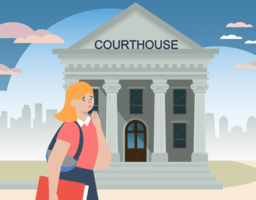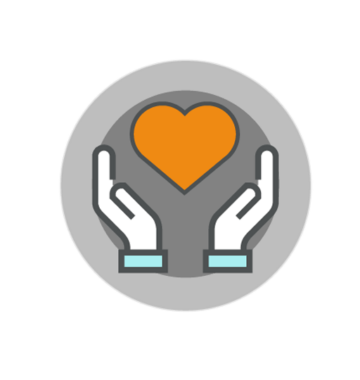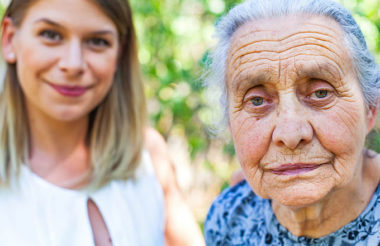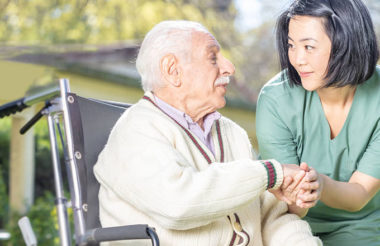Accreditations and Endorsements



This module will introduce you to some key elements of assistive technology and give you an overview of telecare and telehealth.
You’ll also see how appropriate assistive technology can provide solutions for a variety of people requiring support in their own homes.
Learning Outcomes for this module include:
Become aware of the different types of assistive technology and how they help people live their lives
Understand their responsibility of making people aware of the technology available.






In this module on communication in adult care the learner will learn how to: Enhance their communication skills Use augmentative communication methods effectively Overcome […]

Welcome to this e-learning course about promoting and sustaining dignity and respect in the workplace. Topics covered include promoting independence, privacy and confidentiality, and […]

This lesson is designed for anyone who requires an intermediate understanding of autism and the support autistic people may need.

This lesson is designed for anyone who requires a general understanding of autism and the support autistic people may need and meets the requirements of the Core Capabilities Framework for Supporting Autistic People (2019).

“Autism is a difference in the way a person thinks, perceives and therefore understands the world and others,” (Autism Initiatives). What this means is […]

This module has been created in co-production between a social care professional and an expert by experience who has Down’s Syndrome. We have also […]

Since 2019, Adult Social Care workers have been attending court more and more. This lesson is designed to support those who need to attend […]

The National Skills Academy for Social Care Leadership Qualities Framework (LQF) sets out what good quality leadership should be for both individuals and organisations. […]

Care and support planning is a holistic, person-centred process for people with long-term conditions who need personal care and support. It enables the individual to identify […]


In this module about the Mental Capacity Act 2005 and Deprivation of Liberty Safeguards (DoLS), we take a look at the function and application […]

This module explores the factors that contribute to causing a stroke, the different types of strokes, the strategies which can help prevent them occurring, […]

This module will help learners to understand the skills and behaviours that are essential to be an effective supervisee and how to get the […]




This module is designed to enable a practitioner to follow the correct process to provide care and support for service users. It covers what […]

Self-harm is an extremely complex issue, both for those who self-harm and the professionals who support them. This module looks specifically at individuals who […]

Self-neglect is complex and varied and is often misunderstood. This module looks at the three main types of self-neglect, who is at risk, how […]

This module explores the ethos of reablement, who’s involved and its benefits. It will also help the learner understand how individuals are assessed and […]

This module on recording skills looks at the importance of keeping records and how to record information correctly in the social care setting. It […]

Radicalisation is defined as the process by which individuals come to support terrorism and violent extremism and, in some cases, to participate in terrorist […]

The Care Quality Commission (CQC) updated the inspection framework for health and social care in 2017 to align service inspections. Learning Outcomes for this […]

Around 180,000 patients develop a pressure ulcer in hospital each year. This module looks at the eight principles of pressure ulcer management as well […]

Person-centred Approaches Part 1 The first of three modules in this course which meets the requirements of the Skills for Health, Health Education England […]

Person-centred Approaches Part 2a The second of three modules in two parts, in this course which meets the requirements of the Skills for Health, […]

Person-centred Approaches Part 2b The second of three modules in two parts, in this course which meets the requirements of the Skills for Health, […]

Person-centred Approaches Part 3 The Final of three modules in two parts, in this course which meets the requirements of the Skills for Health, […]

Personal resilience is an important quality for helping people adapt and develop effective coping strategies to stressful working conditions and improve wellbeing in the […]

This module starts by exploring the values and principles underpinning personalisation and the role of the social worker in delivering personalised services. It also […]

In this e-learning on Positive Behaviour Support, often referred to as PBS, you’ll begin with an overview of PBS and explore challenging behaviours. Next, […]

Do you ever find it difficult to connect with someone you are supporting? How can you get to know the real person? In this […]

This module will introduce you to leadership styles including democratic and transactional. You will also learn about a number of different leadership theories. Learning […]

This module is for health and social care staff who work with people who have a learning disability. It will give you information about […]

This module on Incontinence Management is split into two parts, and is for those supporting people living with incontinence in settings such as social […]

This module on Incontinence Management is split into two parts, and is for those supporting people living with incontinence in settings such as social […]

The Homelessness Reduction Act places new legal duties on local authorities and housing authorities to reduce and prevent homelessness. This e-learning provides an overview […]

Forced marriage is a form of honour based violence. This module will look at what honour means in the context of honour based violence […]

The End of Life Care Suite contains four modules covering tiers 1 and 2. Tier 1 — Those that require general end of life […]

The End of Life Care Suite contains four modules covering tiers 1 and 2. Tier 1 — Those that require general end of life […]

The End of Life Care Suite contains four modules covering tiers 1 and 2. Tier 1 — Those that require general end of life […]

The End of Life Care Suite contains four modules covering tiers 1 and 2. Tier 1 — Those that require general end of life […]

This module looks to raise awareness of dementia, including, what it is, the different types, how it is caused, the symptoms, who it affects […]

To ensure a full understanding of the content encountered in this module, please ensure that you have completed the Dementia Awareness module (Tier 1) […]

To ensure a full understanding of the content encountered in this module, please ensure that you have completed the Dementia Awareness module (Tier 1) […]

To ensure a full understanding of the content encountered in this module, please ensure that you have completed the previous 3 modules in this […]

To ensure a full understanding of the content encountered in this module, please ensure that you have completed the previous 4 modules in this […]

This module is designed to increase your awareness of domestic abuse and looks at your responsibilities as a health professional. It looks at the […]

In this module we explore the ways children, young people and vulnerable adults are exploited by criminal activity and give you mechanisms to safeguard […]

Coercive control is when a partner or family member continually behaves in a way which makes a person feel controlled, threatened, isolated or scared. […]

This module looks at the issues regarding adult weight such as the causes and impact of obesity. It will help learners to understand what […]

If you’d like temporary access to this collection, or to discuss it with a member of the team, fill out the form below.
"*" indicates required fields
Products that work beautifully on their own and seamlessly when you put them together